Papers by Daniel R . Correa
UNT Dallas L. Rev. On The Cusp, 2024
Special thanks to the On The Cusp editors for their hard work on this article. Thanks also to Wen... more Special thanks to the On The Cusp editors for their hard work on this article. Thanks also to Wendy Correa, Abigail Correa, and Mason Correa for their love and support through the research and writing process. 1 THE DECLARATION OF INDEPENDENCE para. 2 (U.S. 1776). 2 Neither the original Constitution nor the Bill of Rights expressly secured the right to vote. The "right to vote" made its first appearance in the Fourteenth Amendment, section 2-not as a standalone express right to all citizens, but as a punitive provision to reduce a state's representation in Congress if the state disenfranchised male citizens aged twenty-one or older. Notably, the age, gender, and even citizenship components of section 2 were listed as contingent features of the "right to vote."
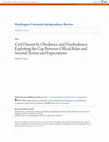
Civil dissent comes in many forms, from peaceful protest to open violation of official rules. But... more Civil dissent comes in many forms, from peaceful protest to open violation of official rules. But strict obedience to official rules may also serve as a dissenting act. Professors Jessica Bulman-Pozen and David E. Pozen examine obedience as dissent in their article, Uncivil Obedience. The term “uncivil obedience” is meant to capture what Bulman-Pozen and Pozen consider the paradox expressed by “insolence toward law” through conformity to law. This inversely mirrors the paradox expressed by a civil disobedient’s fidelity to law through violation of law. Conceptually, ‘uncivil obedience’ is best understood as a form of civil disobedience. An uncivil obedient’s departure from societal expectations or norms serves the same purpose as a civil disobedient’s departure from an official rule: both expose the gap between law and societal expectations or norms and draw attention to what is just, right, or good to close the gap. Analyzing what Bulman-Pozen and Pozen term “uncivil obedience” as ...
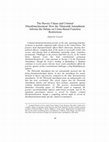
The Slavery Clause and Criminal Disenfranchisement: How the Thirteenth Amendment Informs the Debate on Crime-Based Franchise Restrictions, 2021
Criminal disenfranchisement persists as the only remaining franchise
exclusion of mentally compet... more Criminal disenfranchisement persists as the only remaining franchise
exclusion of mentally competent adult citizens in the United States. The
practice itself disproportionally affects Black Americans, denying their
political efficacy, stripping them of the means to successful reentry into
society, and placing them in diminished citizenship status, sometimes
permanently. Challenges to the practice find little success, as the United
States Supreme Court has held constitutional permanent
disenfranchisement for crime pursuant to Section 2 of the Fourteenth
Amendment. Though the Court’s holding in Richardson v. Ramirez
continues to receive great criticism, lower courts nonetheless affirm the
practice against various constitutional challenges, citing Richardson for
support.
The Thirteenth Amendment has not substantially factored into the
felony-disenfranchisement debate. In fact, the amendment lies mostly
dormant in theory and practice compared to the other Reconstruction
amendments. Yet the Thirteenth Amendment plays an indispensable role
that has been overlooked. This article argues that the Thirteenth
Amendment informs and advances three primary arguments against
criminal disenfranchisement: (1) The practice unconstitutionally
diminishes citizenship status; (2) Whether penal or nonpenal, the
practice unconstitutionally imposes status-based servitude; and (3) No
legitimate government interest is served by blanket criminal
disenfranchisement, though a compelling interest might be served by
disenfranchisement under specific, limited circumstances.
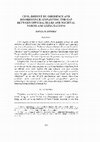
Civil dissent comes in many forms, from peaceful protest to open violation of official rules. Bu... more Civil dissent comes in many forms, from peaceful protest to open violation of official rules. But strict obedience to official rules may also serve as a dissenting act. Professors Jessica Bulman-Pozen and David E. Pozen examine obedience as dissent in their article, Uncivil Obedience. The term “uncivil obedience” is meant to capture what Bulman-Pozen and Pozen consider the paradox expressed by “insolence toward law” through conformity to law. This inversely mirrors the paradox expressed by a civil disobedient’s fidelity to law through violation of law.
Conceptually, ‘uncivil obedience’ is best understood as a form of civil disobedience. An uncivil obedient’s departure from societal expectations or norms serves the same purpose as a civil disobedient’s departure from an official rule: both expose the gap between law and societal expectations or norms and draw attention to what is just, right, or good to close the gap. Analyzing what Bulman-Pozen and Pozen term “uncivil obedience” as an act of civil disobedience also avoids theoretical problems when confronted with general jurisprudence questions pertaining to the concept of law, and avoids practical problems, namely, sleight-of-hand political maneuvering.
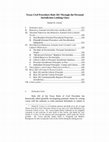
The Texas Supreme Court recently held that a "proper court" under Civil Procedure Rule 202— the r... more The Texas Supreme Court recently held that a "proper court" under Civil Procedure Rule 202— the rule that allows a potential plaintiff to file a petition for a court order to depose a potential defendant—is one where venue would be proper, subject jurisdiction is proper, and the court may assert personal jurisdiction over the defendant. The Court did not address the question whether Rule 202 would violate the Fourteenth Amendment's Due Process Clause absent a personal jurisdiction requirement, which raises two related constitutional questions: (1) Does a potential non-resident defendant waive personal jurisdiction in any ensuing litigation in the state by submitting to a Rule 202 deposition? And (2) Is a court's Rule 202 personal jurisdiction judgment binding on the parties on that issue at the trial level if the petitioner files suit in a Texas Court?
This article addresses these two questions by examining the Texas Supreme Court's reasoning in In re Doe (Trooper) in relation to the United States Supreme Court's personal jurisdiction precedent.
This article explores the impact of the United States recent personal jurisdiction cases, Daimler... more This article explores the impact of the United States recent personal jurisdiction cases, Daimler AG v. Bauman and Walden v. Fiore, on the stream-of-commerce metaphor in product liability cases. The history that underlies personal jurisdiction jurisprudence points to a principled approach to personal jurisdiction that will yield consistent and predictable application in state and federal courts.
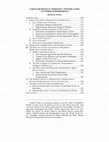
Legal philosophers have long labored to articulate a single standard by which practitioners and, ... more Legal philosophers have long labored to articulate a single standard by which practitioners and, to a lesser degree, members and passersby in any political society can identify the demands law makes of them. The challenge has always been to reconcile competing moral concerns between legal philosophers who hold that morality informs the inquiry and those who hold that social facts inform the inquiry without regard to whether one considers the law’s content good or evil. These debates, in large part, remain internal to legal practice, rarely inviting and hardly accessible to the general public.
Jeremy Waldron approaches the age-old inquiry by narrowing its focus. Rather than ask how law presents itself generally, Waldron asks how law presents itself in a democratic political system. Representatively enacted legislation epitomizes law in a democratic system for Waldron. To accept Waldron’s exposition of what law is like in a truly democratic system is to adopt a new approach to jurisprudence. The challenge is to take the promise that democracy makes seriously, that anything that aspires to the status of law permeate with an ethos of equality of participation. Although Waldron does not explicitly offer a vision for the judiciary in his democratic jurisprudence, this Article argues that his works implicitly offer such a vision. The jurisprudential inquiry no longer turns to what a traditional judge or judges do in courts; rather, a jurisprudential challenge is issued to increase the opportunities for and capacity of citizens to actively participate on an equal basis in choosing the laws that govern them. Jurisprudes are led, that is, toward a jury-centered jurisprudence.
"Choice of law" is not about choice, but about a conflict between two or more states' laws that a... more "Choice of law" is not about choice, but about a conflict between two or more states' laws that a judge must resolve. When the issue is actual causation, no conflict between states' laws occurs; the legal standard for actual cause is a factual inquiry, not one of law. This article argues that actual cause is not an appropriate conflict of laws issue for the court.
This article explores the conceptual role "racism" and "equality" play in public race-relations d... more This article explores the conceptual role "racism" and "equality" play in public race-relations dialogue.
This article discusses the causation requirements for plaintiffs to prove their prima facie case ... more This article discusses the causation requirements for plaintiffs to prove their prima facie case in asbestos cases.
This article explicates two recent U.S. Supreme Court personal jurisdiction opinions to provide s... more This article explicates two recent U.S. Supreme Court personal jurisdiction opinions to provide substantive guidance for defense attorneys.
The article takes the position that conflict of laws analysis is not appropriate when the issue i... more The article takes the position that conflict of laws analysis is not appropriate when the issue is actual causation, which is a question of fact.
A jury cannot be precluded from apportioning fault to bankrupt parties in asbestos litigation. Ba... more A jury cannot be precluded from apportioning fault to bankrupt parties in asbestos litigation. Bankruptcy trusts operate as settlements of the debtor's liability to past and future creditors (injured parties). As settled parties, Defendants are entitled to have the jury assess these parties fault against solvent defendants and the plaintiff(s).
This article aims to demonstrate both the unworkable application and untenable implication of pri... more This article aims to demonstrate both the unworkable application and untenable implication of principles of distributive justice that call for State action to remove economic inequality. Part I provides an overview of the Libertarian and Progressive theories of distributive justice. Part II argues that the State cannot justify its use of coercive force to enact and enforce distributive policies aimed to correct brute luck inequalities. Part III argues that State policies designed to select native endowments for favor or disfavor serve to direct the order and tempo of societal growth. Spontaneity, however, provides our tools to survive in an unpredictable world of constant change. Our free development and expression of our talents benefit all persons, whether we intend to or not. This delicate process argues against intrusive State interference.
II's notable dissent in Poe v. Ullman. President Henry carefully examines Justice Harlan's method... more II's notable dissent in Poe v. Ullman. President Henry carefully examines Justice Harlan's method of constitutional interpretation. Refusing to adopt a "literalistic" reading of the Constitution and instead looking to the "history and purposes" of a particular constitutional provision, Justice Harlan's approach serves as a source of both flexibility and restraint. Of particular importance is Justice Harlan's recognition of the role that "living" traditions play in supplying meaning to the concept of due process of law. What emerges from this probing review of Justice Harlan's Poe dissent is a moderate and thoughtful response to originalism.
Harv. Latino L. Rev., Jan 1, 2011
... The subject of immigration reform tends to inflame patriotic sentiments that cloud one&#x... more ... The subject of immigration reform tends to inflame patriotic sentiments that cloud one's ability to reason and to openly and rationally discuss the problem.... Justice as fairness, as the political conception, requires members in society to put forth only those values that ...
Uploads
Papers by Daniel R . Correa
exclusion of mentally competent adult citizens in the United States. The
practice itself disproportionally affects Black Americans, denying their
political efficacy, stripping them of the means to successful reentry into
society, and placing them in diminished citizenship status, sometimes
permanently. Challenges to the practice find little success, as the United
States Supreme Court has held constitutional permanent
disenfranchisement for crime pursuant to Section 2 of the Fourteenth
Amendment. Though the Court’s holding in Richardson v. Ramirez
continues to receive great criticism, lower courts nonetheless affirm the
practice against various constitutional challenges, citing Richardson for
support.
The Thirteenth Amendment has not substantially factored into the
felony-disenfranchisement debate. In fact, the amendment lies mostly
dormant in theory and practice compared to the other Reconstruction
amendments. Yet the Thirteenth Amendment plays an indispensable role
that has been overlooked. This article argues that the Thirteenth
Amendment informs and advances three primary arguments against
criminal disenfranchisement: (1) The practice unconstitutionally
diminishes citizenship status; (2) Whether penal or nonpenal, the
practice unconstitutionally imposes status-based servitude; and (3) No
legitimate government interest is served by blanket criminal
disenfranchisement, though a compelling interest might be served by
disenfranchisement under specific, limited circumstances.
Conceptually, ‘uncivil obedience’ is best understood as a form of civil disobedience. An uncivil obedient’s departure from societal expectations or norms serves the same purpose as a civil disobedient’s departure from an official rule: both expose the gap between law and societal expectations or norms and draw attention to what is just, right, or good to close the gap. Analyzing what Bulman-Pozen and Pozen term “uncivil obedience” as an act of civil disobedience also avoids theoretical problems when confronted with general jurisprudence questions pertaining to the concept of law, and avoids practical problems, namely, sleight-of-hand political maneuvering.
This article addresses these two questions by examining the Texas Supreme Court's reasoning in In re Doe (Trooper) in relation to the United States Supreme Court's personal jurisdiction precedent.
Jeremy Waldron approaches the age-old inquiry by narrowing its focus. Rather than ask how law presents itself generally, Waldron asks how law presents itself in a democratic political system. Representatively enacted legislation epitomizes law in a democratic system for Waldron. To accept Waldron’s exposition of what law is like in a truly democratic system is to adopt a new approach to jurisprudence. The challenge is to take the promise that democracy makes seriously, that anything that aspires to the status of law permeate with an ethos of equality of participation. Although Waldron does not explicitly offer a vision for the judiciary in his democratic jurisprudence, this Article argues that his works implicitly offer such a vision. The jurisprudential inquiry no longer turns to what a traditional judge or judges do in courts; rather, a jurisprudential challenge is issued to increase the opportunities for and capacity of citizens to actively participate on an equal basis in choosing the laws that govern them. Jurisprudes are led, that is, toward a jury-centered jurisprudence.
exclusion of mentally competent adult citizens in the United States. The
practice itself disproportionally affects Black Americans, denying their
political efficacy, stripping them of the means to successful reentry into
society, and placing them in diminished citizenship status, sometimes
permanently. Challenges to the practice find little success, as the United
States Supreme Court has held constitutional permanent
disenfranchisement for crime pursuant to Section 2 of the Fourteenth
Amendment. Though the Court’s holding in Richardson v. Ramirez
continues to receive great criticism, lower courts nonetheless affirm the
practice against various constitutional challenges, citing Richardson for
support.
The Thirteenth Amendment has not substantially factored into the
felony-disenfranchisement debate. In fact, the amendment lies mostly
dormant in theory and practice compared to the other Reconstruction
amendments. Yet the Thirteenth Amendment plays an indispensable role
that has been overlooked. This article argues that the Thirteenth
Amendment informs and advances three primary arguments against
criminal disenfranchisement: (1) The practice unconstitutionally
diminishes citizenship status; (2) Whether penal or nonpenal, the
practice unconstitutionally imposes status-based servitude; and (3) No
legitimate government interest is served by blanket criminal
disenfranchisement, though a compelling interest might be served by
disenfranchisement under specific, limited circumstances.
Conceptually, ‘uncivil obedience’ is best understood as a form of civil disobedience. An uncivil obedient’s departure from societal expectations or norms serves the same purpose as a civil disobedient’s departure from an official rule: both expose the gap between law and societal expectations or norms and draw attention to what is just, right, or good to close the gap. Analyzing what Bulman-Pozen and Pozen term “uncivil obedience” as an act of civil disobedience also avoids theoretical problems when confronted with general jurisprudence questions pertaining to the concept of law, and avoids practical problems, namely, sleight-of-hand political maneuvering.
This article addresses these two questions by examining the Texas Supreme Court's reasoning in In re Doe (Trooper) in relation to the United States Supreme Court's personal jurisdiction precedent.
Jeremy Waldron approaches the age-old inquiry by narrowing its focus. Rather than ask how law presents itself generally, Waldron asks how law presents itself in a democratic political system. Representatively enacted legislation epitomizes law in a democratic system for Waldron. To accept Waldron’s exposition of what law is like in a truly democratic system is to adopt a new approach to jurisprudence. The challenge is to take the promise that democracy makes seriously, that anything that aspires to the status of law permeate with an ethos of equality of participation. Although Waldron does not explicitly offer a vision for the judiciary in his democratic jurisprudence, this Article argues that his works implicitly offer such a vision. The jurisprudential inquiry no longer turns to what a traditional judge or judges do in courts; rather, a jurisprudential challenge is issued to increase the opportunities for and capacity of citizens to actively participate on an equal basis in choosing the laws that govern them. Jurisprudes are led, that is, toward a jury-centered jurisprudence.